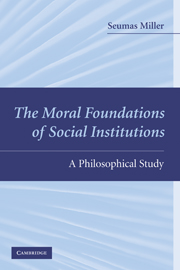12 - Government
Published online by Cambridge University Press: 05 June 2012
Summary
GOVERNMENT AS A META-INSTITUTION
As we have seen, according to my individualist, teleological theory of social institutions, the ultimate justification for the existence of fundamental human institutions such as government, the education system, the economic system, and the criminal justice system, is their provision of some collective good or goods to the community (see also Miller 2001b, chap. 6).
Moreover, these collective goods are, normatively speaking, the collective ends of institutions, and as such they conceptually condition the social norms that govern, or ought to govern, the constitutive roles and activities of members of institutions, and therefore the deontic properties (institutional rights and duties) that attach to these roles. Thus, a police officer has certain deontic powers of search, seizure, and arrest, but these powers are justified in terms of the moral good – legally enshrined human rights, say – that it is, or ought to be, the role of the police officer to maintain.
It is also worth reiterating that there is no easy rights versus goods distinction. Human rights certainly function as a side constraint on the behavior of institutional actors. But equally, the securing of human rights can be a good that is aimed at by institutional actors.
Further, a defining property of an institution is its substantive functionality (or telos), and so a putative institutional entity with deontic properties, but stripped of its substantive functionality, typically ceases to be an institutional entity, at least of the relevant kind; would-be surgeons who cannot perform surgery are not surgeons.
- Type
- Chapter
- Information
- The Moral Foundations of Social InstitutionsA Philosophical Study, pp. 321 - 346Publisher: Cambridge University PressPrint publication year: 2009



